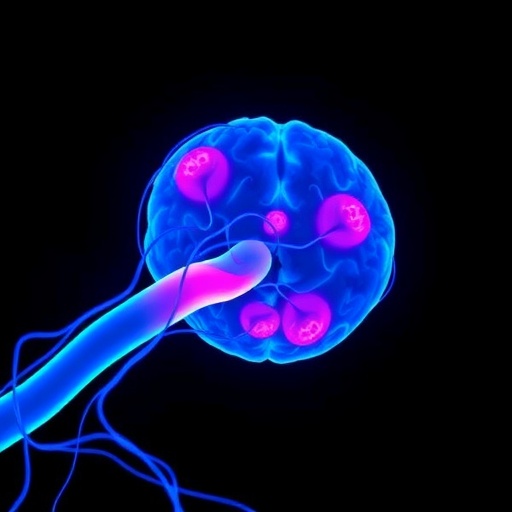A groundbreaking study from NYU Langone Health has revealed a critical connection between impaired blood flow and accelerated cancer progression, shedding new light on how vascular health influences tumor growth. The research, published on August 19, 2025, in JACC CardioOncology, demonstrates that ischemia—an obstruction of blood flow caused by artery narrowing—not only affects cardiovascular outcomes but also promotes rapid tumor development by prematurely aging the bone marrow’s immune function.
Ischemia, often resulting from the buildup of fatty deposits such as cholesterol within arterial walls, instigates inflammation and clot formation that restrict the delivery of oxygen-rich blood to bodily tissues. While its link to cardiovascular diseases like heart attack and stroke is well recognized, this latest investigation extends the implications of ischemia to oncologic processes. Specifically, when peripheral arteries in the legs experience restricted blood flow—a condition known as peripheral artery disease (PAD)—it can double the growth rate of breast tumors, as demonstrated in murine models.
The study utilized a novel mouse model bearing nascent breast tumors, subjecting one hind limb to temporary ischemic conditions to mimic peripheral artery disease. Researchers observed a pronounced acceleration in tumor proliferation in the mice with ischemia compared to controls with normal circulation. This finding aligns with earlier work from the same group in 2020, which identified similar tumor-promoting effects of ischemia during myocardial infarction, thereby reinforcing the notion that disrupted blood flow broadly facilitates cancer progression across different physiological settings.
.adsslot_Va1A6ztDmr{ width:728px !important; height:90px !important; }
@media (max-width:1199px) { .adsslot_Va1A6ztDmr{ width:468px !important; height:60px !important; } }
@media (max-width:767px) { .adsslot_Va1A6ztDmr{ width:320px !important; height:50px !important; } }
ADVERTISEMENT
Central to these pathological effects is the impact ischemia has on the immune system’s hematopoietic stem cells within the bone marrow. The bone marrow serves as the reservoir for stem cells responsible for generating all immune cell types necessary for maintaining immune surveillance against infections and neoplastic growths. However, ischemic injury was found to reprogram these stem cells in a manner comparable to accelerated aging, skewing their differentiation toward myeloid lineage cells such as monocytes, macrophages, and neutrophils.
This “myeloid bias” comes at the expense of lymphocytes, particularly T cells, which are instrumental in orchestrating potent anti-tumor immune responses. The shift creates a systemic immune environment that favors immunosuppressive cell populations. Not only are these immune cells less effective at detecting and eliminating cancer cells, but their accumulation within tumor microenvironments actively shields malignant cells from immune-mediated destruction.
Within these ischemia-affected tumors, the cellular composition revealed a surge in Ly6C^hi monocytes and M2-like macrophages characterized by F4/80^+ and MHCII^lo markers, as well as regulatory T cells. These subsets collectively generate an immune milieu permissive to cancer growth by attenuating inflammatory responses and dampening cytotoxic activities. The remodeling of the tumor’s immune landscape underscores the systemic nature of ischemia-induced immune dysfunction.
Beyond alterations in cellular proportions, ischemia induces profound molecular changes at the chromatin level. The researchers documented extensive reorganization of chromatin architecture in bone marrow immune progenitors, limiting access to genes crucial for inflammatory and anti-cancer activities. These epigenetic modifications stabilize a gene expression program that perpetuates immune tolerance towards tumors, effectively enabling cancer cells to evade immune eradication.
Such findings indicate that the effects of ischemia extend far beyond transient tissue damage, triggering long-lasting reprogramming of the hematopoietic and immune systems that mimics premature aging. This phenomenon elucidates a biological mechanism linking chronic vascular impairment with increased cancer vulnerability, suggesting that cardiovascular conditions can inadvertently foster oncogenesis.
The implications of this research are wide-ranging. It highlights the necessity of integrating vascular and metabolic health considerations into comprehensive cancer prevention and treatment strategies. For patients with peripheral artery disease, earlier cancer screening may be warranted to detect tumors before ischemia-driven immune suppression promotes aggressive growth. Additionally, therapies targeting inflammation modulation might counteract the immune skewing caused by ischemic injury.
Looking forward, the NYU Langone Health team aims to translate these insights into clinical applications by designing studies that evaluate whether existing anti-inflammatory and immune-modulating drugs can mitigate post-ischemic changes and reduce cancer progression rates. Such interventions could revolutionize treatment paradigms, especially in populations at high risk for concomitant cardiovascular and oncologic disease.
This multidisciplinary study was led by Kathryn J. Moore, PhD, and Alexandra Newman, PhD, from the Jean and David Blechman Professor of Cardiology and Postdoctoral Scholar at the Leon H. Charney Division of Cardiology, NYU Grossman School of Medicine. Their collaborative effort brought together immunology, cardiology, and oncology experts to unravel the complex crosstalk between ischemic vascular injury and immune dysfunction driving tumor growth.
Funded by prominent agencies including the American Heart Association and the National Institutes of Health, the research underscores the importance of continued exploration into the interface of cardiovascular pathology and cancer biology. As the aging population faces increasing burdens of chronic vascular diseases and cancer, understanding and interrupting these interconnections will be critical to improving patient outcomes.
In summary, this pivotal study delineates how peripheral ischemia precipitates a cascade of immune alterations, mirroring hematopoietic aging, which facilitates the rapid expansion of breast tumors. By exposing this pathophysiological link, researchers have opened new avenues for preventative strategies and therapeutics that address both vascular health and tumor immunity simultaneously.
Subject of Research: Interaction between ischemic vascular injury and immune system aging in cancer progression
Article Title: Ischemic Injury Drives Nascent Tumor Growth via Accelerated Hematopoietic Aging
News Publication Date: 19-Aug-2025
Web References:
https://pubmed.ncbi.nlm.nih.gov/32661390/
http://dx.doi.org/10.1016/j.jaccao.2025.05.016
References:
NYU Langone Health study, JACC CardioOncology, August 19, 2025
Keywords: Cancer, cardiovascular disorders, ischemia, peripheral artery disease, bone marrow aging, immune suppression, tumor microenvironment, hematopoietic stem cells, myeloid bias, T cells, inflammation, chromatin remodeling
Tags: cancer progression and blood circulationcardiovascular health and oncologycholesterol buildup and ischemiaimpaired blood flow and cancer growthinflammatory response in tumor developmentischemia and immune system agingJACC CardioOncology publicationmouse model for cancer researchNYU Langone Health cancer researchperipheral artery disease and breast cancertumor growth acceleration mechanismsvascular health and tumor progression





